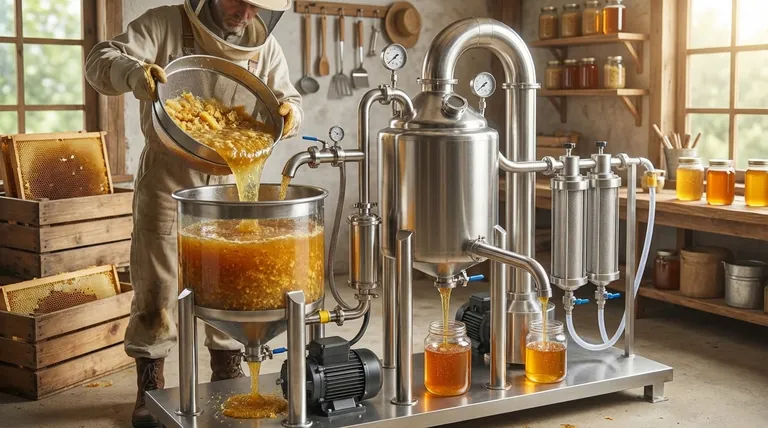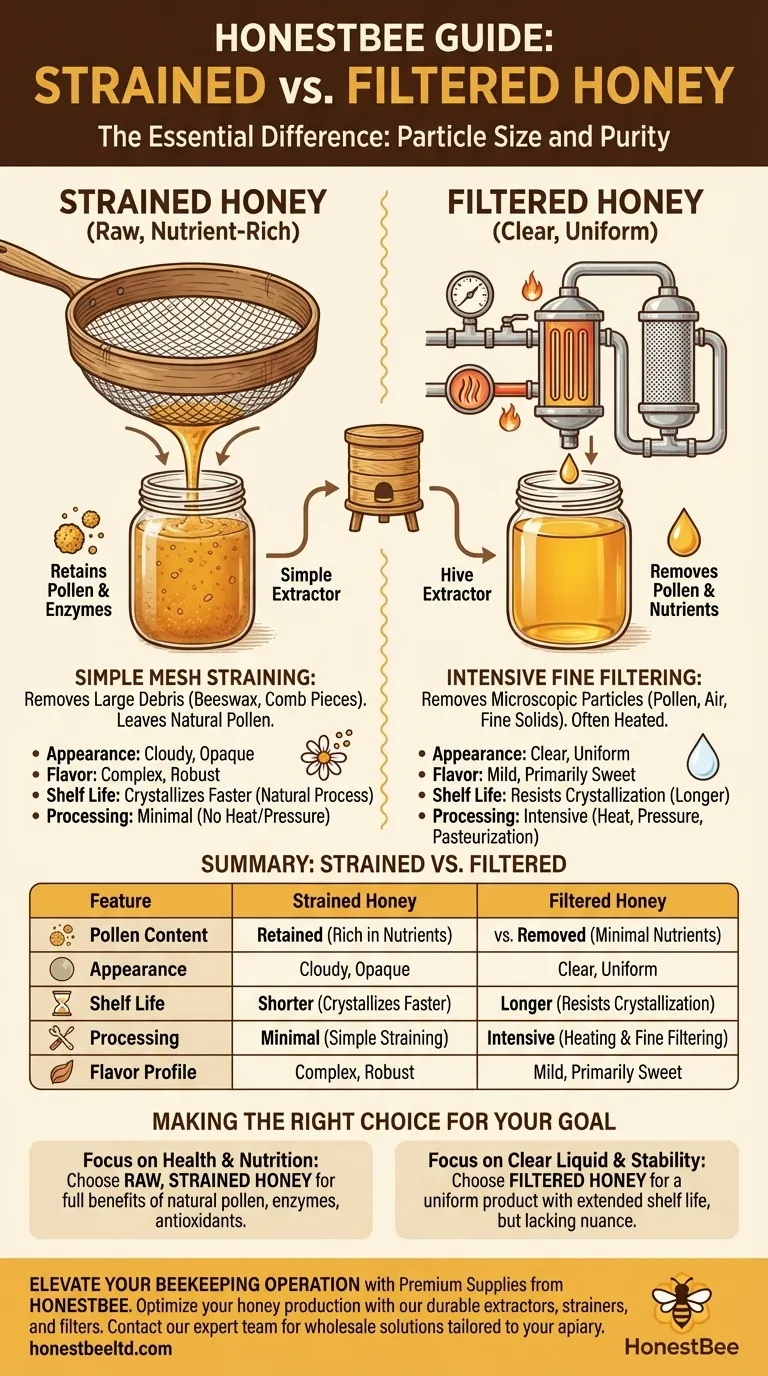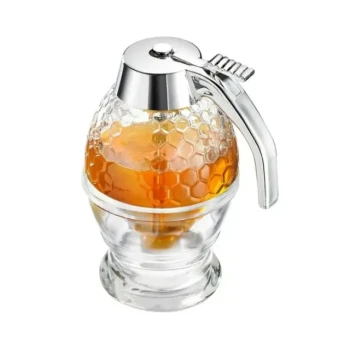At its core, the difference is particle size. Strained honey is passed through a simple mesh to remove large debris like beeswax and comb pieces while retaining natural pollen. Filtered honey undergoes a more intensive process that removes even the finest particles, including nearly all pollen, resulting in a clearer, more uniform liquid.
The choice between strained and filtered honey is a trade-off. You are deciding between a product that retains its natural components, like pollen and enzymes, versus a product prized for its clarity and exceptionally long shelf life.

The Fundamental Difference: What Gets Removed
The terms "strained" and "filtered" refer to the level of purification honey undergoes after being extracted from the comb. The key distinction is the size of the particles that are left behind.
What Straining Removes: The Big Stuff
Straining is a minimal, necessary step for almost all honey. It involves passing the honey through a mesh or screen.
This process removes visible, unwanted debris such as pieces of beeswax, parts of the honeycomb, or other impurities from the hive. Crucially, it leaves the beneficial, microscopic pollen grains intact.
What Filtering Removes: The Microscopic Stuff
Filtering is a much more aggressive process typically used in large-scale commercial production.
Honey is often heated to become less viscous and then forced under high pressure through a very fine filter. This method removes not only large debris but also the microscopic particles, including virtually all of the pollen, air bubbles, and other fine solids.
Why This Distinction Matters
Removing microscopic particles like pollen fundamentally changes the honey's character, nutritional profile, and behavior. This is the deep need behind understanding the difference.
The Impact on Nutrients
Pollen is a primary source of the vitamins, minerals, amino acids, and antioxidants found in honey. Filtering removes the pollen, and with it, many of these beneficial compounds.
Raw, strained honey retains this pollen, which is often sought after for its potential health benefits and richer nutrient profile.
The Effect on Flavor and Appearance
The fine solids in strained honey, including pollen, contribute to its unique flavor, aroma, and thicker texture. Its appearance is often opaque or cloudy.
Filtered honey, by contrast, has a uniform, brilliantly clear appearance. Its flavor is often milder and more one-dimensional, primarily just "sweet."
The Link to Pasteurization
In commercial settings, filtering is almost always paired with pasteurization (heating to high temperatures).
Heat makes the honey flow more easily for filtering and bottling, but it also destroys delicate enzymes and antioxidants. Raw honey, whether strained or completely unprocessed, is never pasteurized.
Understanding the Trade-offs
Neither method is inherently "wrong," but they serve different goals and result in very different products. Choosing between them requires understanding their respective advantages and disadvantages.
The Benefit of Filtering: Clarity and Stability
The primary goal of filtering is to create a visually appealing product that resists crystallization. Because pollen particles act as starting points (nuclei) for crystals to form, removing them dramatically slows this natural process.
This gives filtered honey an extremely long shelf life on the grocery store shelf without solidifying.
The "Problem" with Strained Honey: Crystallization
Because strained honey contains pollen and other fine particles, it will crystallize much faster.
It's critical to understand that crystallization is a natural and reversible process. It is a sign of high-quality, raw honey, not spoilage. Gently warming the jar will return it to a liquid state.
Making the Right Choice for Your Goal
Your choice should be guided by what you value most in your honey—its nutritional content or its appearance and stability.
- If your primary focus is health and nutrition: Choose raw, strained honey (often labeled "unfiltered") to ensure you get the full benefits of its natural pollen, enzymes, and antioxidants.
- If your primary focus is a clear liquid sweetener with a long shelf life: Choose filtered honey, but understand that it lacks the nuanced flavor and nutritional complexity of its raw counterpart.
Ultimately, knowing the difference empowers you to choose the honey that best aligns with your purpose.
Summary Table:
| Feature | Strained Honey | Filtered Honey |
|---|---|---|
| Pollen Content | Retained (Rich in nutrients) | Removed (Minimal nutrients) |
| Appearance | Cloudy, Opaque | Clear, Uniform |
| Shelf Life | Shorter (Crystallizes faster) | Longer (Resists crystallization) |
| Processing | Minimal (Simple mesh straining) | Intensive (Heating & fine filtering) |
| Flavor Profile | Complex, Robust | Mild, Primarily sweet |
Elevate Your Beekeeping Operation with Premium Supplies from HONESTBEE
Understanding the nuances of honey processing is key to producing a superior product. Whether your commercial apiary or distribution business focuses on raw, nutrient-rich strained honey or clear, stable filtered honey, the quality of your equipment is paramount.
HONESTBEE supplies commercial apiaries and beekeeping equipment distributors with the durable, high-performance supplies needed for efficient extraction, straining, and filtering. We help you maintain product integrity from hive to jar.
Ready to optimize your honey production? Contact our expert team today to discuss wholesale solutions tailored to your apiary's scale and goals.
Visual Guide

Related Products
- 0.5T Capacity Honey Dehumidifier Dryer with Vacuum Heating and Thickening Filtering Machine
- Economy Honey Homogenizer Mixer and Melting Machine for Beekeeping
- High Quality Honey Dehumidifier Dryer Thickening Machine for Beekeeping
- 10L Stainless Steel Electric Honey Press Machine
- Natural Wood Honey Dipper for Tea Coffee and Desserts
People Also Ask
- What principle does the honey vacuum thickener use to concentrate honey? Preserve Quality with Low-Temperature Evaporation
- What are the processing advantages of using industrial dehumidification equipment for high-moisture tropical honey?
- How does a honey dryer remove moisture from honey? Achieve Perfect Honey Stability with Controlled Drying
- What are some methods to prevent fermentation in high-moisture honey? Protect Your Honey's Quality and Value
- How to reduce moisture level in honey? Preserve Quality and Prevent Fermentation



















